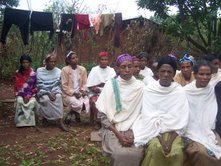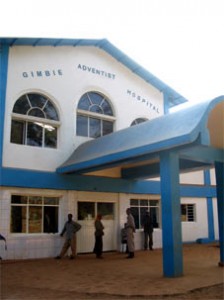Integrated Maternal Health Programme, Phase 1, 2007-2009
From 2007 to 2009 Maternity Worldwide led an integrated maternal health programme in West Wollega in the Oromia region of Ethiopia. The programme drew on the already established links which Maternity Worldwide had developed in the area. The charity was set up in 2002 and in 2003 began working with Adventist Health International (AHI) to help develop maternity services in this part of western Ethiopia. Early work focused on running the delivery unit in the newly constructed AHI hospital in Gimbie.
In 2005 Maternity Worldwide carried out a comprehensive needs assessment to identify which factors were the leading contributors to the high rates of maternal mortality and morbidity in the area. Based on the criteria in the Three Delays Model, the needs assessment showed that there were a wide range of factors which would need to be addressed to improve maternal health and reduce maternal mortality:
Delay in seeking care due to:
- Low status of women
- Financial barriers
- Poor understanding of maternal health problems
Delay in reaching healthcare once decision taken to seek treatment due to:
- Poor roads
- Mountains, rivers and difficult terrain
Delay in receiving effective, high quality treatment once the health facility is reached due to:
- Lack of skilled professionals
- Poorly equipped facilities
- Shortage of essential drugs
The award of a Big Lottery Fund grant enabled Maternity Worldwide to put in place an integrated maternal health programme to address each of these barriers.
The programme ran from 2007 to 2009. The goal was:
To reduce maternal morbidity and deaths amongst women in West Wollega and consequently improve the health, well-being and economic stability of vulnerable women, their children, families and communities.
Activities were carried out both in the community and at Gimbie Adventist Hospital. The main focuses were:
- Carrying out community health promotion sessions on maternal and reproductive health and addressing women’s rights and status
- Establishing women’s income generating groups enabling women to set up their own businesses and giving them increased financial independence and improved influence within their communities
- Improving the quality of maternal health care by training local clinical staff and providing essential equipment, drugs and supplies.
In addition a Safe Birth Fund was set up to provide the poorest women in the zone with the funds necessary to pay the fees being charged by the hospitals for delivery.
Underpinning the work was a framework of programme steering groups to ensure the commitment and involvement of stakeholders and the community which was essential if the programme was to succeed and achieve sustainability.
The integrated maternal health programme was very successful and met or exceeded all of its targets:
The number of deaths in childbirth amongst women with complications of pregnancy who attended Gimbie Adventist Hospital fell from 6.2% to 0.6%
- The number of women having their babies at the hospital and health centres increased by 51%.
- There were 110,000 attendances at health promotion sessions (ten times higher than the target)
- Sixteen staff were trained as Skilled Birth Assistants along with 11 assistants.
- 1200 women participated in the income generating scheme and set up their own businesses. Within two years 90% of the women had made profits and were able to make loan repayments
The independent evaluation of the programme carried out for the Big Lottery Fund said:
“The strengths of the programme include the huge achievements made in a short period with a limited number of personnel.”

“The impacts were wide-ranging with benefits relating to family health, children’s schooling, women’s economic status, social standing and peace of mind.”
“The profits made from income generating activities had a clear, positive effect on women’s ability to travel to hospital for delivery and pay a contribution for any medical procedures necessary.”
For more information about the programme please do take a look at our short films about the work or the summary or full version of the independent evaluation.


